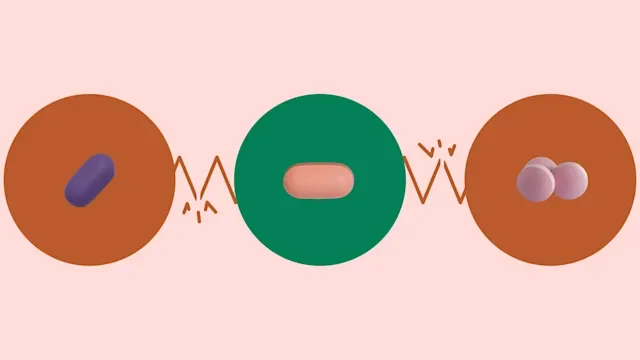Key takeaways:
Statins are the go-to treatment option for lowering cholesterol levels and risk of cardiovascular complications, like heart attack and stroke.
Statins work by slowing down cholesterol production and enabling the liver to remove low-density lipoproteins (LDL), or “bad cholesterol,” from the bloodstream.
While they are effective, statins do have possible side effects.
Save on related medications
As you get older, rising cholesterol levels are normal. But millions of adults age 20 and older have high cholesterol — with a total cholesterol of more than 200 mg/dL.
Many people with high cholesterol don’t experience symptoms until they have a heart attack or stroke. Every year, there are more than 877,500 deaths from heart attacks, strokes, and other heart-related medical conditions in the U.S. In fact, heart disease is the leading and stroke is the fifth-leading cause of death in the U.S.
You can’t control rising cholesterol levels that come with age. But you can prevent the worsening of cholesterol levels through diet and exercise. And if lifestyle changes aren’t enough, your healthcare provider may recommend a statin medication to help. Statins are a first-choice medication to help lower cholesterol, and they have the added benefit of lowering the risk of heart attack and stroke.
Below, we’ll discuss what you should know about statins. We’ll also briefly talk about another cholesterol-lowering medication class.
What are statins?
Statins are a group of cholesterol-lowering medications, which include:
Atorvastatin (Lipitor)
Pravastatin (Pravachol)
Rosuvastatin (Crestor)
Simvastatin (Zocor)
Pitavastatin (Livalo)
Statins are among the most commonly prescribed drugs in the U.S. for a reason: They can lower your LDL (low-density lipoproteins) cholesterol (the “bad cholesterol”) by 25% to 50% or more, depending on the specific statin and dose. Statins are also helpful in lowering the risk of heart attack and stroke.
Statins are available as tablets that can be taken by mouth. Simvastatin is also available as an oral liquid called FloLipid.
How do statins work?
Statins are hydroxymethylglutaryl-CoA (HMG-CoA) reductase inhibitors. HMG-CoA is a protein that plays a role in making cholesterol. By blocking HMG-CoA, statins slow down cholesterol production. This, in turn, enables the liver to remove more LDL from your bloodstream and lower LDL levels.
Read more like this
Explore these related articles, suggested for readers like you.
Statins may also lower your risk for heart attack and stroke by:
Lowering the amount of plaques (fatty build-up) in your arteries
Preventing existing plaques from turning into clots
Lowering inflammation in your arteries
What you should know about statins
Time with your healthcare provider can be limited, so you may not have heard all of the upsides and downsides when you were prescribed a statin. Here are 10 lesser-known, interesting facts about statins.
1. Generics work just as well as brands and can save you money
Generic statins are as effective as their brand-name counterparts. They work the same to treat your cholesterol. Generic versions are also less costly.
In a 2014 study, researchers found that people taking the generic statins were more likely to adhere to statin therapy compared to people taking the brand-name statins. They were also found to have an 8% lower rate of heart attack or death compared to those taking brand-name statins.
2. Some people report memory problems, but research has yet to confirm a link to statins
People taking certain statins have reported memory problems. This tends to be reported more often with statins that cross the blood-brain barrier, like simvastatin (Zocor) and atorvastatin (Lipitor). Memory problems have been reversible after stopping the medication.
Current research doesn’t support a definitive link between statins and memory problems. But if you experience them while taking a statin, talk to your healthcare provider. There are other statin options, like pravastatin (Pravachol) and rosuvastatin (Crestor), that don’t cross the blood-brain barrier.
3. The benefits might not outweigh the risks for everyone
Statins can be beneficial for people who already have, or are at high risk for, cardiovascular disease or who have very high cholesterol levels. But if you’re at low risk for cardiovascular disease, the benefits of statin therapy might not outweigh the risks.
In other words, your cholesterol levels might not be the only factor considered when deciding if a statin is right for you. Depending on your situation, your healthcare provider may use a cardiovascular disease risk calculator to decide if you would benefit from statin therapy.
4. If you need a statin, you may end up taking it long term
Lifestyle changes — like exercising and quitting smoking — help to keep your cholesterol levels in check. But statins are important, too. This is especially the case if you’re at high risk for cardiovascular disease.
So, if your healthcare provider recommends a statin, you will typically take it until you’re at least 75 years old. And, depending on your risk factors and how you’re tolerating treatment, your healthcare provider may have you continue taking it for longer.
5. Statins can cause rare but serious side effects
Statins have a few rare but serious side effects to know about. These include:
Kidney failure: Although rare, severe forms of muscle damage from statins can result in acute kidney failure. Get medical attention right away if your muscle pain is accompanied by dark-colored urine.
Liver damage: Statins can cause changes in your liver enzymes. And, in rare cases, serious liver damage has been reported. The risk of this happening may be higher if you have a history of liver disease or drink heavily more than 5 days per month.
Stroke: If you have a history of hemorrhagic strokes, statins may raise your risk of having another one. A hemorrhagic stroke is a type of stroke caused by a ruptured blood vessel that bleeds into the brain.
For more information about statin side effects, speak with your pharmacist or healthcare provider.
6. Not all statins carry the same risk for muscle problems
Statins are commonly associated with muscle pain and weakness. But you may be surprised to learn that this is more common with certain statins.
For example, simvastatin might be more likely to cause this side effect. And fluvastatin may be least likely to cause muscle problems.
7. You may not need to give up grapefruit juice completely
You’ve heard this for years. Grapefruit juice can affect how your liver breaks down statin medications. And high amounts of statin in the body may raise your risk of statin side effects. However, three statins seem to be most affected by grapefruit juice: simvastatin, atorvastatin, and lovastatin.
There’s good news, though. Some evidence suggests that consuming a moderate amount of grapefruit or grapefruit juice may not have a meaningful impact on the health of your liver. But it’s best to check with your healthcare provider about how much is safe to consume. You might also have the option to switch to a statin that’s less affected by this interaction.
8. You might be more prone to muscle pain if your vitamin D levels are low
Vitamin D supplements have been shown to improve symptoms of muscle pain from statins in people with low vitamin D.
If you have muscle aches from a statin, have your vitamin D level checked. If your levels are low, talk with your healthcare provider about ways to raise them. Consider giving statins another try, too.
9. Coenzyme Q10 doesn’t really help the muscle problems
Despite many loyal followers taking CoQ10, there is no evidence that it improves or prevents statin-associated muscle side effects.
10. Statins can raise the risk of developing diabetes
This gets tricky. Statins help lower the risk of cardiovascular disease in people with diabetes. But they can also slightly raise the risk of developing diabetes — especially in people who already have risk factors for the condition. Even so, the benefits from statin therapy tend to outweigh this small risk.
Statin alternatives: What else helps lower cholesterol?
Although statins tend to be first-choice medications for high cholesterol, there are several other options available if you can’t take them. A few examples include:
PCSK9 inhibitors: These injectable medications are very effective at lowering cholesterol. And, like statins, they can lower the risk of heart attack and stroke. The downside is that they’re very expensive. Examples of PCSK9 inhibitors include alirocumab (Praluent) and evolocumab (Repatha).
Bile acid sequestrants: These oral medications tend to be the safest option for lowering cholesterol. But they may not lower cholesterol as well as other medications. Examples of bile acid sequestrants include cholestyramine (Prevalite) and colestipol (Colestid).
Inclisiran (Leqvio): This is an injectable medication that was approved in early 2022. It’s very effective at lowering cholesterol. But we don’t yet know if it has the same cardiovascular benefits as statins. It’s given as two doses per year, but it’s expensive without insurance.
The best medication for you can depend on your medical history, cholesterol levels and goals, and age. Talk to your healthcare provider about your options.
The bottom line
Statins are effective cholesterol-lowering medications that can also lower your risk for heart attack or stroke. There are some risks and side effects to consider, but keep in mind that these don’t always apply to all statins. If you have any questions, reach out to your pharmacist or healthcare provider.

Why trust our experts?


References
American Heart Association. (n.d.). 2018 prevention guidelines tool CV risk calculator.
Centers for Disease Control and Prevention. (2021). High cholesterol facts.
Centers for Disease Control and Prevention. (2022). Heart disease and stroke.
Gagne, J., et al. (2014). Comparative effectiveness of generic and brand-name statins on patient outcomes. Annals of Internal Medicine.
Grundy, S. M., et al. (2018). AHA/ACC/AACVPR/AAPA/ABC/ACPM/ADA/AGS/APHA/ASPC/NLA/PCNA guideline on the management of blood cholesterol: A report of the American College of Cardiology/American Heart Association task force on clinical practice guidelines. Circulation.
MedlinePlus. (2020). Cholesterol levels: What you need to know.
National Institute of Diabetes and Digestive and Kidney Diseases. (2017). Bile acid resins or sequestrants. LiverTox: Clinical and Research Information on Drug-Induced Liver Injury.
National Institute on Alcohol Abuse and Alcoholism. (n.d.). Drinking levels defined.
Newman, C. B., et al. (2018). Statin safety and associated adverse events: A scientific statement from the American Heart Association. Arteriosclerosis, Thrombosis, and Vascular Biology.
Pergolizzi, J., et al. (2020). Statins and muscle pain. Expert Review of Clinical Pharmacology.
Pinal-Fernandez, I., et al. (2018). Statins: Pros and cons. Medicine Clinica.
Reddy, P., et al. (2011). Serum concentrations and clinical effects of atorvastatin in patients taking grapefruit juice daily. British Journal of Clinical Pharmacology.
Sizar, O., et al. (2022). Statin medications. StatPearls Publishing.

















